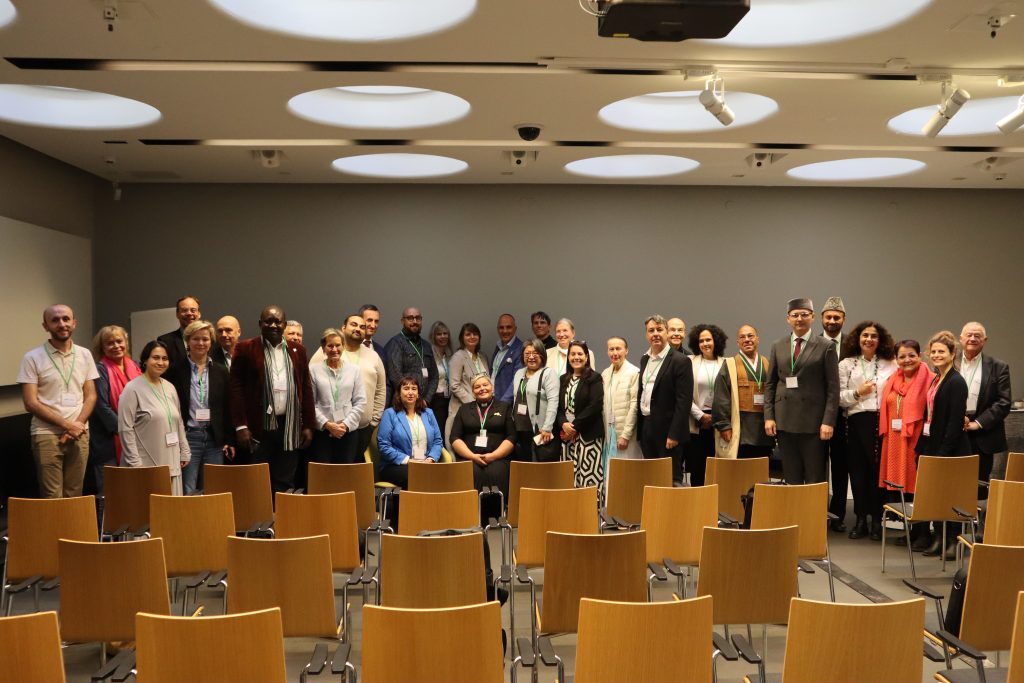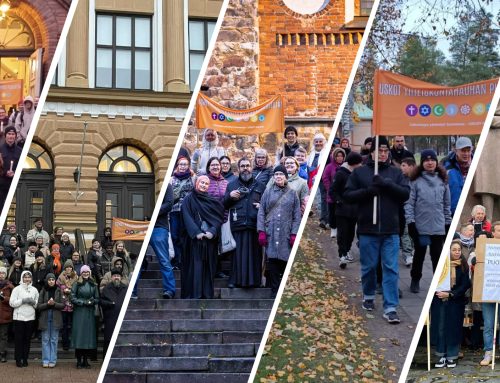
How to counter polarization and promote unity among religious communities? – International and local religious leaders, interfaith dialogue actors, and academic representatives gathered for the seminar “The Global Convergence Challenge – Summit for Interfaith Unity and Peace Network Seminar for International and Interreligious Actors”
The seminar was held on September 25–26 at the Church Council’s Mikael Hall. In addition to the seminar, the international organization Religions for Peace and its European movemet ENIB held their annual board meeting, hosted by Religions for Peace Finland – CORE Forum. The seminar invited interfaith dialogue practitioners, university representatives, religious leaders, authorities, and representatives of various religions from both Finland and abroad. Topics discussed included polarization, Islamophobia, antisemitism, interreligious peace mediation, and dialogue.
The keynote speech was delivered by Genti Kruja, Chair of Religions for Peace Europe. The seminar was opened by Pavlos Ylinen, Chair of the CORE Forum, and Katri Kuusikallio, Executive Director. In her speech, Kuusikallio noted that while discrimination against religions exists, the potential of religions in peacebuilding is widely recognized. Laura Huovinen, Vice Chair of the Forum’s Board, hosted the event.

Genti Kruja, who was elected Chair of ENIB at the beginning of 2025, addressed Europe’s polarization and international religious cooperation. He stated that although there is currently a strong anti-religious sentiment globally, the seminar’s gathering is a sign of unity. Religions are not part of the problem but part of the solution. Kruja emphasized that peace work is done for the benefit of younger generations and that it is important to set an example of joint efforts for peace. His speech encouraged religious leaders to combat racism, xenophobia, and hate speech.
Following Kruja’s keynote, commentary speeches were given by Dr. Mercédesz Czimbalmos from the Polin Institute, Angeliki Ziaka from the World Council of Churches, Maria Leppäkari, Secretary General of Religions for Peace Europe, and Ramil Belyaev, Imam of the Finnish-Islamic Congregation.
Czimbalmos focused on the history and challenges of antisemitism, presenting findings from a recent study on antisemitism in Finland, which surveyed Jewish residents about their experiences. The research and Czimbalmos’ presentation showed that antisemitism has increased in Finland.

Angeliki Ziaka, representing the World Council of Churches (WCC), emphasized the organization’s commitment to peacebuilding but noted that religious organizations alone are not enough. She highlighted the importance of civil society and universities, and their collaboration in achieving sustainable peace. Ziaka also pointed out that the roles of women and youth in peacebuilding have long been overlooked, despite their crucial contributions.
Maria Leppäkari also highlighted the important role of women, noting their absence in global arenas. She emphasized the significance of interfaith dialogue actors being at the forefront of the battle for peace and dialogue.
Imam Ramil Belyaev of the Finnish-Islamic Congregation spoke about Islamophobia in Finland. His presentation included recommendations for combating Islamophobia and emphasized the importance of integration. He also discussed the role of media in fuelling Islamophobia. Belyaev shared the history of the Finnish-Islamic Congregation in Finland, the country’s first Islamic association, founded in 1925 by Tatar immigrants.

The seminar’s panel discussion explored polarization and the fight against religion-motivated racism in Finland. Panellists included Gurmann Saini, Executive Director of the Hindu Forum of Finland, Jyri Komulainen, Lead Expert in Research and Education at the Evangelical Lutheran Church, Matti Cantell, Special Adviser of Radicalisation and Extreme Violence at the Deaconess Foundation, and Johanna Sumiala, Professor of Media and Communication Studies at the University of Helsinki. The panel was moderated by Laura Huovinen.
The discussion highlighted that many factors contribute to polarization, especially those related to religion and identity. Power dynamics and political rhetoric can deepen divisions when politicians exploit oppositional narratives to advance their agendas. In Finland, people are not always ready to engage in difficult conversations, and the lack of dialogue can gradually lead to deeper polarization. It is essential to find ways to reduce confrontation.
Combating religion-motivated racism requires conscious intervention in normalized racist discourse. Panellists pointed out that such discourse can also come from high levels of society, thereby normalizing discriminatory attitudes. Discussion indicated that the roots of racism often lie beneath the surface in everyday life, making its recognition more difficult. Building trust and cooperation between different actors requires concrete actions at various levels. Fear and perceived threats can hinder mutual understanding, making political decisions crucial. The panellists discussed that in Finland, religions are often viewed from a secular perspective, which can lead to a lack of understanding of their significance in people’s lives. This, too, can complicate dialogue and joint action.



